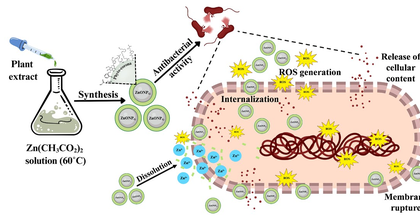NIT Rourkela researchers pioneer green alternative to fight antibiotic resistance
By IANS | Updated: October 15, 2025 14:45 IST2025-10-15T14:43:57+5:302025-10-15T14:45:16+5:30
New Delhi, Oct 15 In a bid to tackle the problem of antimicrobial resistance, researchers at the National ...

NIT Rourkela researchers pioneer green alternative to fight antibiotic resistance
New Delhi, Oct 15 In a bid to tackle the problem of antimicrobial resistance, researchers at the National Institute of Technology (NIT) Rourkela have used extracts from medicinal plants to produce potent antibacterial agents that are environmentally safe and effective.
The overuse of traditional antibiotics has resulted in the rise of “superbugs” that have become resistant to these treatments.
The study, published in the Surfaces and Interphases journal, used an eco-friendly approach and produced zinc oxide nanoparticles -- known to damage bacterial cells and disrupt their normal functions.
However, instead of using harsh chemicals, the team used extracts from leaves and petals of Marigold, Mango, and Eucalyptus to reduce zinc salts into zinc oxide nanocrystals with adsorbed phytocompounds from the extracts.
The extract-coated nanoparticles, particularly made from marigold petals, were twice as effective at killing bacteria compared to chemically synthesised nanoparticles or plant extracts alone.
The extracts not only aided in the synthesis of nanoparticles but also helped stabilise nanoparticles through the formation of a herbal shield or phytocorona. It also helps in controlling the release of the zinc ions and ensures steady antibacterial action.
The flavonoids, alkaloids, tannins, and phenolic phytocompounds in these extracts have inherent antibacterial properties, resulting in a double attack on bacterial existence.
“The green-synthesized zinc oxide nanoparticles with phyto-corona, as a sustainable and effective antimicrobial platform, offer a promising solution to combat antimicrobial resistance while leveraging the medicinal properties of surface-adsorbed plant-derived phytocompounds,” said Prof. Suman Jha, Associate Professor at the Department of Life Science, NIT Rourkela.
The use of extracts from indigenous plants makes the technology easy to scale up. This approach encourages home-grown, sustainable solutions that reduce dependence on imported drugs and synthetic antibiotics, which often lead to more problems than solutions.
Disclaimer: This post has been auto-published from an agency feed without any modifications to the text and has not been reviewed by an editor
Open in app